The FBI is seeking Apple’s assistance in unlocking the mobile phone of the gunman authorities say killed three people and wounded eight others last month at a naval base in Pensacola, Florida.
Gizmodo has confirmed that FBI General Counsel Dana Boente requested Apple’s help to unlock the mobile phone in a letter sent late Monday after obtaining a court order to search its contents.
NBC News first reported the letter Tuesday morning.
The 21-year-old shooting suspect, Mohammed Saeed Alshamrani, a second lieutenant in the Royal Saudi Air Force, was participating in a training program at Naval Air Station Pensacola at the time of the shooting, officials said.
Authorities have yet to disclose the suspected motive behind the shooting, but last month said that social media posts critical of American support for Israel apparently belong to Alshamrani. The posts, some of which painted the U.S. as anti-Muslim, have been taken down.
[referenced url=” thumb=” title=” excerpt=”]
NBC previously reported that Alshamrani, a non-citizen, used a loophole in Florida law to acquire a firearm. The loophole allows non-citizens to acquire firearms if they have a hunting licence, as Alshamrani did.
The FBI confirmed having sent the letter. Apple did not respond to Gizmodo’s request for comment.
Apple reportedly told NBC that it had already given the FBI “all of the data” in its possession a month ago.
The FBI request is likely to rekindle the years-old tussle over whether Apple and other phone makers should be legally required to aid investigators by manufacturing devices that can be easily unlocked in criminal cases.
Apple has said its phones are built in such a way that even it lacks the ability to bypass the device encryption. Designing iPhones that could be easily unlocked by the FBI would require Apple to create a “master key” capable of unlocking hundreds of millions of phones, Apple chief executive Tim Cook said in 2016.
Cook has argued that providing this assistance to law enforcement would place an undue burden on Apple’s programmers and would further heighten the risk to consumer privacy.
In 2016, the FBI pursued a court order to compel Apple to unlock the iPhone of Syed Rizwan Farook, the deceased shooter in a December 2015 terrorist attack in San Bernadino, California. The FBI ultimately paid an outside company”reportedly Israeli firm Cellebrite”to unlock the phone.
In 2017, Sen. Dianne Feinstein said that the government paid $US900,000 ($1,297,679) to access Farook’s device.
During a Senate Judiciary Committee hearing last month, Apple’s manager of user privacy, Erik Neuenschwander, said that strong encryption the “underlying technology providing information security in all modern systems.”
“We do not know of a way to deploy encryption that provides access only for the good guys without making it easier for the bad guys to break in,” he said.
